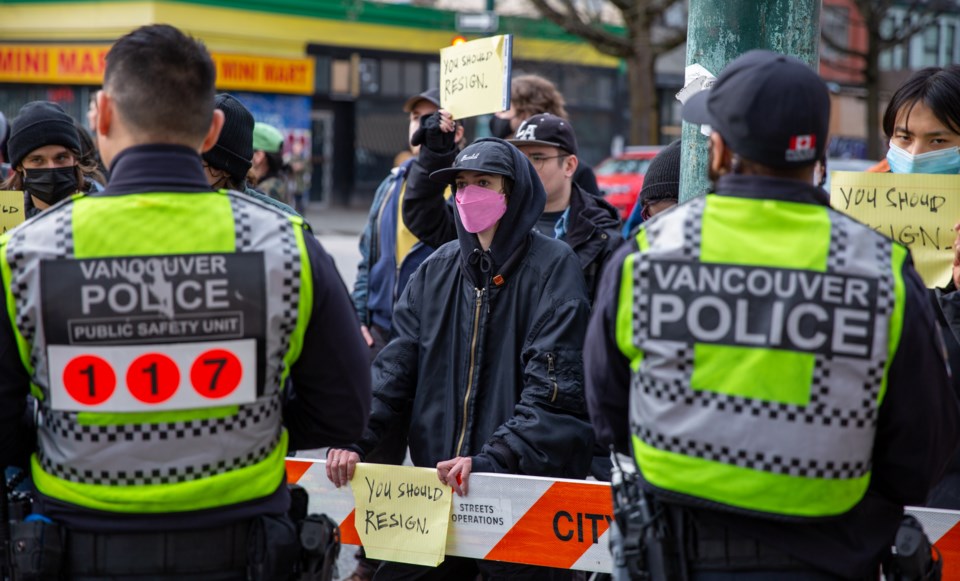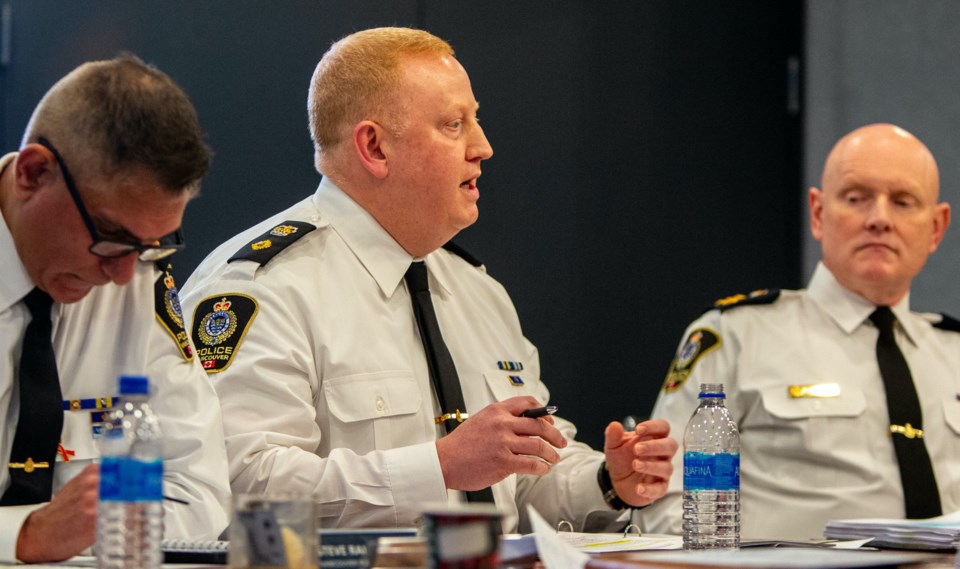The Vancouver Police Department says officers did not set up an “exclusion zone” in April to prevent journalists from covering stepped up action in April to clear sidewalks on East Hastings Street of tents and structures occupied by homeless people.
The department’s statement was in response to a suggestion B.C. Police Complaint Commissioner Clayton Pecknold made in a recent letter to the Vancouver Police Board that an “exclusion zone” was created by the VPD “for the purpose of excluding the public and the media from a specific section of the city for a defined period of time.”
Pecknold came to that conclusion after reading concerns raised by a complainant and public statements made by the VPD regarding the mobilization April 5 and 6 of dozens of officers and city crews in the Downtown Eastside.
Supt. Don Chapman told the police board Nov. 23 that officers did not set up a zone over those two days in April to prevent journalists from covering the major news event, which forced the closure of several blocks along East Hastings.
The action was in response to Fire Chief Karen Fry’s order from July 2022 to clear the sidewalks of tents and structures over concerns of fires and public safety. The action April 5 and 6 was a continuation of city-led efforts over the previous year to dismantle the decampment.
“The VPD did not prevent any journalists or media from entering the Hastings Street encampment zone,” Chapman said. “No exclusion zone was ever set up.”
When the action began on the morning of April 5, media were told to attend a specific staging point, said Chapman, noting a media liaison officer was available at the location to respond to questions.
“If the media were temporarily denied any unfettered access to a specific portion of the zone during the decampment, that decision was made purely for safety reasons,” he said, noting the presence of garbage trucks, transport trucks and other moving vehicles on the street.

'Gross overreach'
Chapman pointed out no visual barriers were erected to prevent anyone from seeing what was happening on the street over those two days.
“It would have been very easy for the city or ourselves to get some very high chainlink portable fencing with some [curtains] and try to prevent people from seeing what was happening,” he said. “It was never our intention to not let people see what was transpiring there.”
After hearing from Chapman, the board dismissed the complaint from a complainant, whose name was redacted from documents in the board’s agenda package. The complaint was dismissed without the board seeking independent advice "distinct from the VPD," as recommended by Pecknold.
The board also dismissed a complaint from another unknown complainant, who alleged “gross overreach of power by the VPD” regarding enforcement action in April.
In response to that complaint, Chapman said the VPD’s role was to keep the peace as city crews dismantled the decampment. He said the VPD was working under the guidance of the provincial ministries of the Attorney General and Housing.
“We supported the city-led initiative,” he said. “At the VPD, we do not employ random or arbitrary street sweeps.”
Chief challenged by reporter
After the board meeting, Police Chief Adam Palmer was challenged by reporters about the board’s decision to dismiss the complaint about the exclusion zone.
Tyee reporter Jen St. Denis shared experiences of being turned away by police on East Hastings. She also mentioned a Reuters photographer being unable to get by police.
“I don't know about your specific situation,” Palmer said.
“But what I will say is that when the city workers were taking stuff out of the tents and decamping and our officers were standing by keeping the peace — and we had dump trucks and city trucks and other things going on there — we have to have a safe zone for people to work in, and that's what we had, and it was temporary."






